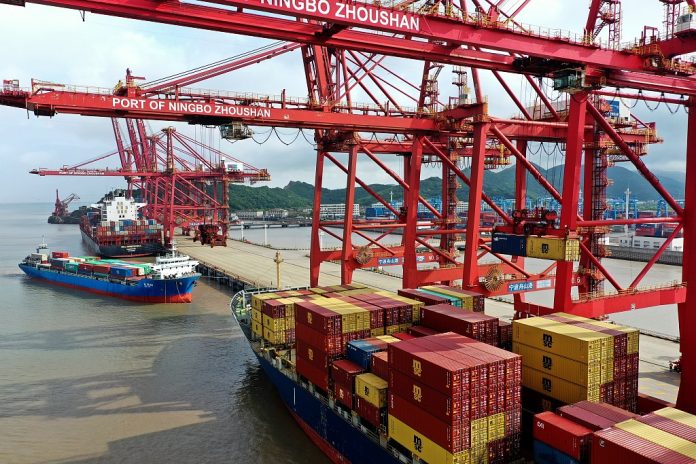Liner operators have advised customers to expect delays following the closure of Ningbo Meishan Island International Container Terminal (MSICT) after a worker there tested positive for Covid-19.
Following confirmation of the worker’s infection, MSICT suspended all operations from 3:30 am local time on 11 August. Other terminals in Ningbo, China’s second busiest container port, restricted gating-in of outbound containers to two days before the estimated arrival of the ships.
Overall, the number of vessels at anchor at Zhoushan increased to 39 as of 13 August from 28 on 10 August, according to the HSBC Global Research report.
However, Linerlytica analyst, Tan Hua Joo told Container News that there is no reason to panic yet. “MSICT accounts for 19% of the total container volumes at Ningbo. If the closure is limited only to MSICT, the situation would still be manageable as long as the closure does not escalate to the other terminals,” he explained.
On the other hand, an analysis by Russell Group’s ALPS Marine platform indicates that the partial closure of the port of Ningbo threatens US$172 billion’s worth of global trade and the export of US$39.2 billion’s worth of Integrated Circuit Boards (ICBs).
Many experts are worried that the disruption may have a large impact on the holiday season, particularly in the US, according to the analysis.
“The closure of Ningbo comes hot on the heels of the recent disruption at Yantian and both serve as a timely reminder to organisations and (re)insurers alike of the fragility of global trade,” highlighted Suki Basi, CEO of Russell Group, which is a solutions provider company.
“Fragility that means that any slight disruption to the network of trade, whether that be a closure of a port or a blockage of a shipping route, creates chaos for shippers, global supply chains and ultimately consumers,” explains Suki Basi.
Moreover, Parash Jain, Head of Shipping & Ports & Asia Transport Research at HSBC, noted this terminal shutdown in Ningbo could trigger another rally in freight rates, as MSICT suspension “fuels fear of heightened congestions and even higher freight rates.”
“If the terminal doesn’t reopen immediately, it could be the next Yantian,” he pointed out.

In the meantime, French liner operator CMA CGM told customers that cargo operations of its ships, the 8,533TEU CMA CGM Samson and 23,104TEU CMA CGM Rivoli, which have been at MSICT since 9 August and 10 August, are temporarily suspended until the terminal resumes operations. The ships are serving the Transpacific and Asia-Europe lanes, respectively.
Following contingency planning, CMA CGM has delayed the expected arrivals of 17,722TEU CMA CGM Kerguelen in Ningbo from 13 August to 16 August.
The 8,533TEU CMA CGM Melisande, which was supposed to have gone to Ningbo and then Shanghai, has had its rotation reversed, and is scheduled to arrive in Shanghai on 18 August, before going on to Ningbo on 20 August.
Additionally, CMA CGM Centaurus, which serves the French carrier’s Columbus PNW Asia-US West Coast service, will omit its call at Ningbo.
Besides CMA CGM Rivoli and CMA CGM Samson, four other container ships, Evergreen Marine Corporation’s Ital Lunare, KMTC Line-operated Sunny Rose, COSCO Shipping Lines’ Xin Ri Zhao and Dong Young Shipping’s Pegasus Tera, have been waiting in MSICT since 9/10 August.
Meanwhile, the 2M Alliance comprising Maersk Line and MSC said that their Ningbo-bound vessels will mainly call at Ningbo Beilun Container Terminal Phase 4, which has a current waiting time of 1.5 to two days.
“A few vessels which call MSICT started to move to other terminals in Ningbo port,” stated Maersk.
The Danish carrier’s AC6 Asia- South America service calls at MSICT and next week’s port call involving Seaspan Oceania will omit Ningbo.
Furthermore, trucking related to empty and laden return from/to MSICT has been suspended from 11 August until further notice, while the Ningbo Blue Dragon Longfei warehouse around the affected terminal has also halted its operations from 11 August until further notice.
 Hotline: 0944 284 082
Hotline: 0944 284 082
 Email:
Email: 


 VN
VN